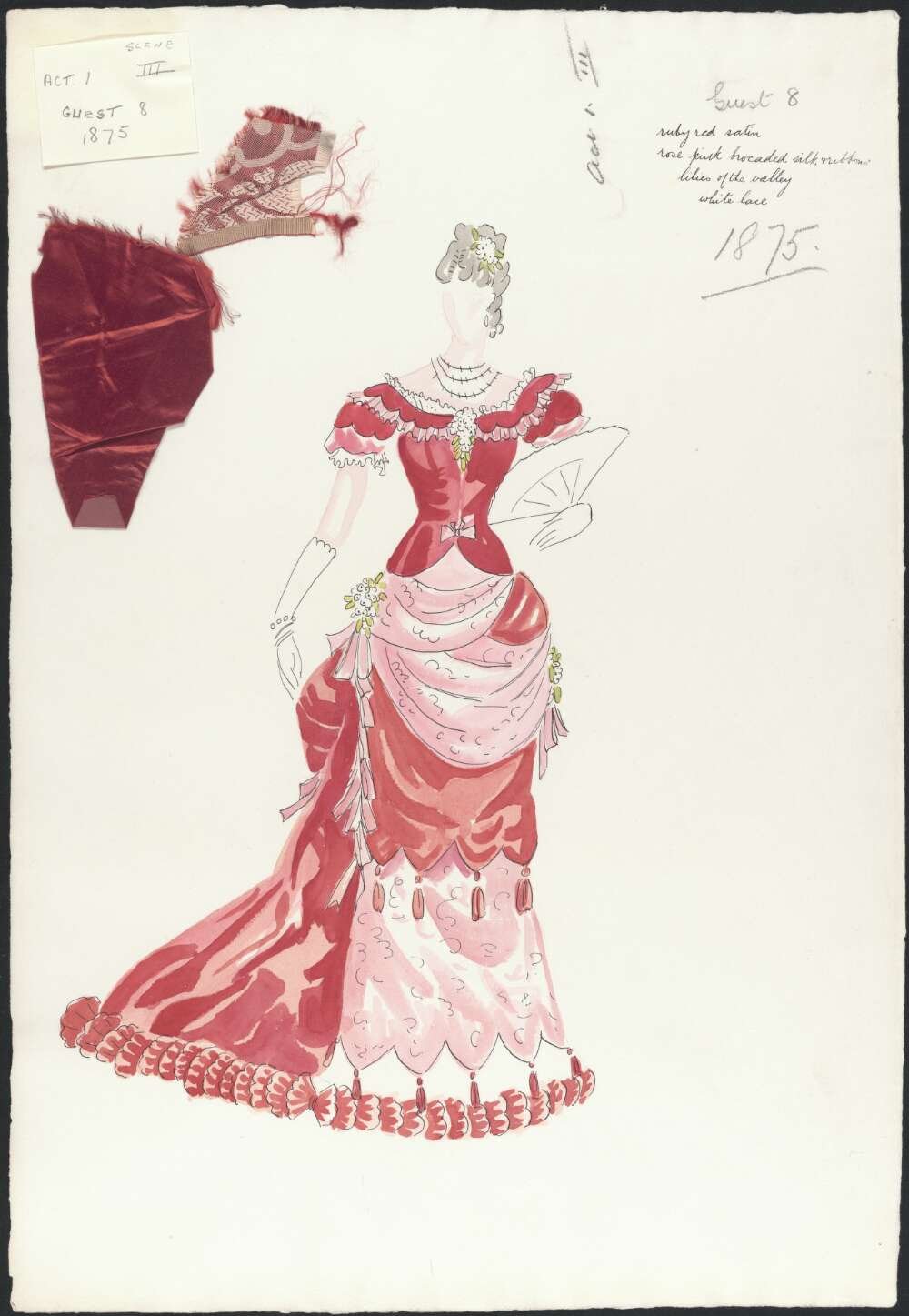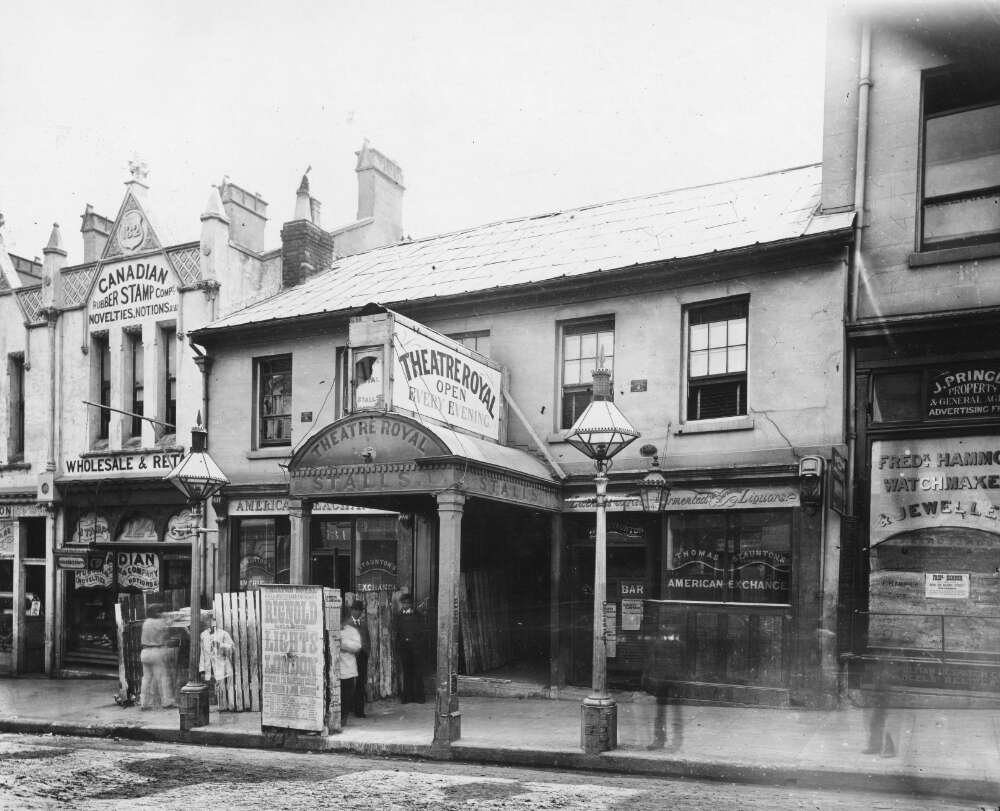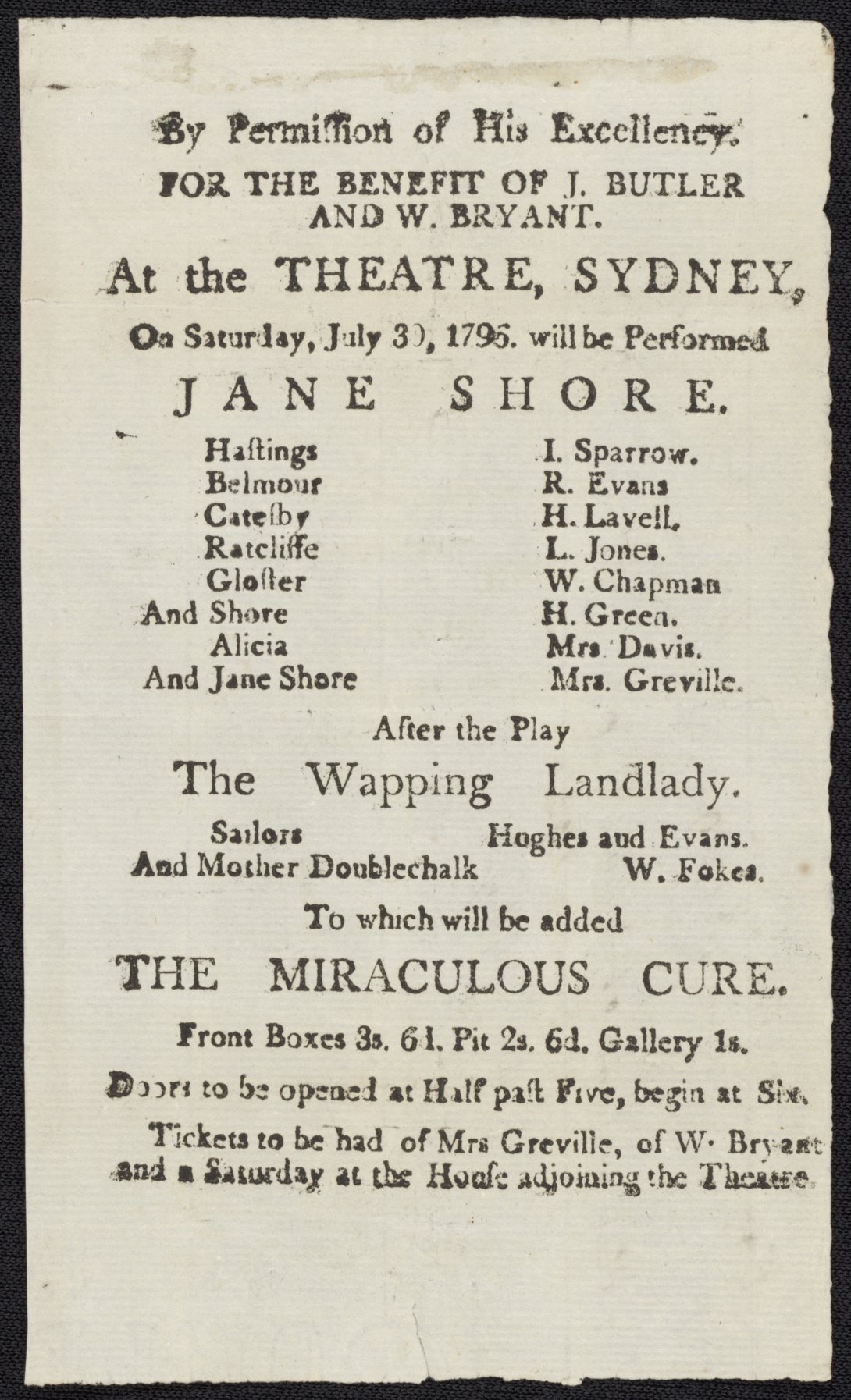Listen to playwright and artistic director Wesley Enoch tell his story through the Seven years on- continuing life histories of Aboriginal leaders oral history project. The Library holds recorded interviews with Enoch from 1996, 2003 and 2001 - request them through the catalogue and listen to them in the Special Collections Reading Room.
Oral histories
Featured collections for costume design
- J.C Williamson productions
- Chu Chin Chow costume design
- Kristian Fredrikson 1996-2001
- Costume design for Tapu


Find information relating to the performance of dramatic and comic theatre in Australia and by Australian performers living or touring overseas.
The Library’s collections document the history and development of dramatic and comic theatre in Australia. The most significant holdings in this area are manuscript collections and oral history recordings. These holdings are enriched by pictorial material and a large collection of theatre programs dating back to the 19th century.
Theatre programs
The PROMPT Australian Performing Arts Programs and Ephemera collection includes rich and expansive resources, such as:
- Australian theatre broadsides: a collection of 4-page leaflets in poster format advertising plays to be performed mainly at Her Majesty's Theatre Sydney
- Aboriginal Theatre : programs and related material
- J.C. Williamson theatre broadsides
- Old Sydney : a collection of press cuttings, theatre and concert programmes, photographs, ephemera, postcards compiled by William Noble
- Programs of concerts, musicals, theatre and other stage productions held in Sydney, Melbourne and Ballarat between 1857 and 1892 : scrapbook
- Sharp Collection: a collection of 150 programs representing a sampling of theatre activities in Sydney concentrating on the period 1898-1907
International theatre influences
The Library holds important performing arts collections in languages other than English. These include collections of plays, programs and rare books.
The collection comprises 1011 plays and libretti published in Italy between about 1720 and 1900. They include a number of Italian translations of plays written by French, German and other European dramatists.
Consists of 2121 books, pamphlets, programs, periodicals and plays published between 1755 and 1972. The majority of the works are plays including modern editions and facsimiles of Portuguese plays extending back to the fifteenth century.
A small collection of German and Austrian books, mostly published in the early years of the twentieth century. They include poetry, plays, novels, essays, fairytales, folklore, art books, memoirs, and books on the theatre and opera.
Materials in this collection include theatre programs, member lists and post cards of Takarazuka Shojo Kagekidan between 1919 and 1945.
Theatre collection highlights
Entrepreneurs and managers
- COPPIN, George Selth, 1819-1906
Actor, theatre manager, politician George Selth Coppin arrived in Australia in 1843. He acquired ownership of New Queen's Theatre, Adelaide in 1846, Theatre Royal, Melbourne in 1856 and Haymarket, Melbourne in 1862. Coppin toured Australia, New Zealand and America as a comic actor and engaged noted actors for Australian tours. Coppin was active in Victorian politics until the 1890s. The Library holds the Papers of George Selth Coppin, 1845-1965, a manuscript copy of his biography, and a collection of photographs.
- WILLIAMSON, J.C., 1845-1913
James Cassius Williamson was an American actor and later Australia’s foremost impresario founding J.C. Williamson Ltd. The enormous archives of J.C. Williamson Ltd comprise business records, playscripts, libretti, music, programs, magazines, books, costume designs and photographs.
Performers
- BAILEY, Bert, 1868-1953
Actor, playwright and theatre director. Born in New Zealand, Albert Edward Bailey was brought up in Australia. At 17, he joined the touring theatrical company of Edmund Duggan. In 1900, he joined William Anderson as leading comedian, and subsequently played a wide variety of character parts. In conjunction with Edmund Duggan he wrote two successful melodramas, The squatter's daughter and The man from outback. In 1912, the Bert Bailey Dramatic Company was formed in partnership with Julius Grant. The Library holds the Papers of Bert Bailey, 1880-1952. See also - Bert Bailey and Edmund Duggan.
- BELL, John, 1940-
Australian actor, theatre director and co-founder of the Nimrod Theatre Company and the Bell Shakespeare Company. John Bell has been a major influence on the development of Australian theatre in the late 20th and early 21st centuries. He married Polish-born Australian actress and theatre director, Anna Volska, in 1963. The Library holds the Papers of John Bell and Anna Volska as well as some interviews.
- CRACKNELL, Ruth, 1925-2002
Ruth Cracknell had a distinguished career, spanning more than 55 years, as one of Australia's leading actors on radio, theatre, film and television. Our collections include the Papers of Ruth Cracknell, interviews and pictures.
- HUMPHRIES, Barry, 1934-
Actor, comedian, writer, and artist, best known for his character Dame Edna Everage. The Library holds the Letters of Barry Humphries as well a collection of theatre programs and oral history recordings.
- QUONG, Rose, 1879-1972
Rose Quong was a Melbourne-born actor and writer who went to England in 1924 to study acting. She performed in England, France, and the United States. Quong also wrote: Chinese written characters : their wit and wisdom. The Library holds the Papers of Rose Quong, 1911-1946.
- ENOCH, Wesley, 1969-
Wesley James Enoch is a Noonuccal Nuugi playwright and artistic director. He is especially known for The 7 Stages of Grieving, co-written with Deborah Mailman. He was artistic director of the Queensland Theatre Company from mid-2010 until October 2015, and completed a five-year stint as director of the Sydney Festival in February 2021. The Library holds oral history interviews and published works of Wesley Enoch.
- NOWRA, Louis, 1950-
Mark Doyle, better known by his stage name Louis Nowra, is an Australian writer, playwright, screenwriter, and librettist. He is best known as one of Australia's leading playwrights. His works have been performed by all of Australia's major theatre companies, including Sydney Theatre Company, Melbourne Theatre Company, Queensland Theatre Company, State Theatre Company of South Australia, Belvoir, and many others, and have also had many international productions. The Library holds the Papers of Louis Nowra, 1971-1999 and Letters of Louis Nowra 1972-1990, to Dave Riley as well as oral history recordings.
- SHARMAN, Jim, 1945-
James David Sharman is an Australian director and writer for film and stage with more than 70 productions to his credit. He is renowned in Australia for his work as a theatre director from the 1960s to the present, and is best known internationally as the director of the 1973 theatrical hit The Rocky Horror Show, its film adaptation The Rocky Horror Picture Show (1975) and the film's follow-up, Shock Treatment (1981). The Library holds the Papers of Jim Sharman, circa 1940-2010.
Designers
- FREDRIKSON, Kristian 1940-2005
Kristian Fredrikson was a New Zealand-born stage and costume designer who worked in Australia from the 1960s. Fredrikson worked on productions for many Australian and international ballet, opera and theatrical companies, including the Melbourne Theatre Company, Australian Ballet, Opera Australia, Sydney Dance Company, New Zealand Ballet and the Houston Ballet. The Library holds the papers of Kristian Fredrikson, an interview with Michelle Potter and a collection of costume designs.
Companies
The Nimrod Theatre Company, also known simply as The Nimrod, was an Australian theatre company in Sydney, New South Wales. It was founded in 1970 by Australian actors John Bell, Richard Wherrett and Ken Horler, and produced "good new Australian drama". The Library holds a collection of theatre programs and posters.
Theatre reference works
- The Australian stage : a documentary history
- Companion to theatre in Australia
- The convict theatres of early Australia 1788-1840
- Dictionary of the Australian Theatre 1788-1914
- Representing Australian Aboriginal music and dance 1930-1970
- See how it runs : Nimrod and the new wave
- Theatre in Australia / John West
Online theatre resources
Resources relating to Australian theatre can be accessed online through our eResources, archived websites, and other freely available databases.
AusStage, Australian Performing Arts Database, Flinders University, SA
Nineteenth Century Collections Online. British theatre, music and literature : high and popular culture
Collection highlight
The Playbill, dated 30 July 1796, is the earliest surviving printed document in Australia.

Recommended resources
- APT.org - The largest source of Australian playscripts
- AussieTheatre.com - Australia's number one theatre news site
- Highlights in Australian theatre history in the Australian Culture and Recreation Portal